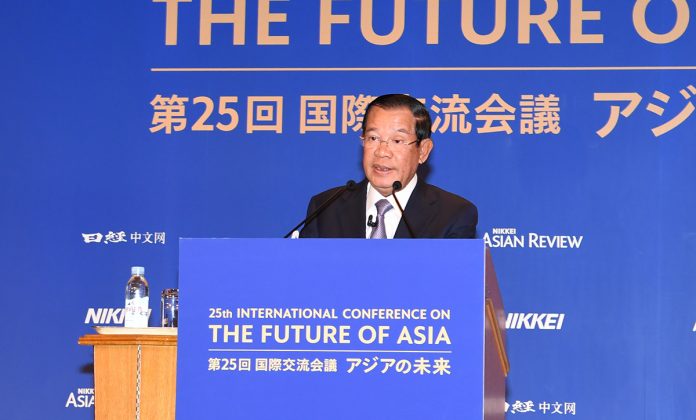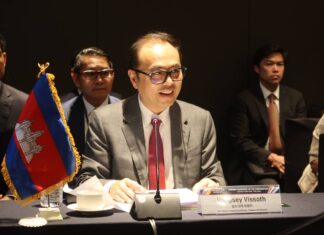- Excellencies Heads of State, Heads of Government,
- Excellencies Representative from International Organizations,
- Excellencies, Ladies and Gentlemen!

Obviously, this year’s theme “Seeking a New Global Order – Overcoming the Chaos” is significant and most relevant to the current context and the future of our region in which we are facing complex and complicated challenges, and uncertainties due to various threats and the fragility of current order and architecture of the world. In this sense, the leaders of our region should contemplate and have a common stance towards solutions in addressing those emerging challenges that are threatening the world and our region nowadays, especially to the current of protectionism, trade war between major powers, and geopolitical crises. Additionally, in the long-run, the world will continue facing major structural change issues, including demographic issues of young and ageing population, issues of infrastructure connectivity, energy security, water and other environmental issues, as well as the advancement of technology which require a closer cooperation between all stakeholders to seek appropriate and timely solutions. I believe this International Conference will instigate new initiatives and notable recommendations in order to improve the current situation aiming to build a glorious future for our region with sustainable and inclusive development in prosperity, peaceful co-existence, and harmony through building confidence, understanding, and mutual trust.
Excellencies, Ladies and Gentlemen!
During the last two decades, we have witnessed the leaping progress of the world in terms of growth and social progress, especially poverty reduction, along with in-depth structural changes in economy, geopolitics, regional and global economic integration as well as the newly emerging challenges due to the competition for power and influence, market, and technology between the old and the emerging superpower, and the pole of powers from other regions in the context of multipolar world.
During this period, Asia, supported by rapid and high economic growth of China and India, has not only become a center of growth, but has also been an important driver for regional and global political stability. Currently, China is the second-largest economy in the world, while India’s economy has rapidly grown more than three times of its size compared to the late twentieth century, making the current India’s economy larger than Canada’s and Russia’s. At the same time, ASEAN has also become a big economic community, characterized by its high growth and comprehensive structural changes, with the economy of 3.1 trillion US dollars, the fifth largest economy in the world, and a high-growth region driven by free trade and productivity growth.
Asia’s rapid economic development has contributed significantly to social progress, poverty reduction, income generating, and improving people’s well-being. At the same time, with a more important role in the global economy, together with the growth in individual country, Asia has also contributed significantly to maintaining stability, peace and regional and global harmony. Such achievements of Asia are mostly derived from adhering to the principles of openness and promoting economic cooperation, expanding regional integration and value chains, promoting free trade and multilateralism as well as engaging in global community and international architecture, which creates a favorable ecosystem for development in all areas.
Despite this, Asia as well as the world is facing ever more complex, complicated and riskier unprecedented crisis, both traditional and non-traditional for short and long-term. These challenges could undermine the progresses and possibly destroy achievements, which our nations have made over the past decades as well as reduce the potential for further development. In this regard, we are deeply concerned about global peace, stability and security towards the evolution of multipolar world arising from competition for interest and the adjustment of balancing global power as well as other hostilities that are causing uncertainty and numbers of possible chaos to the normalization of social-economic development in Asia.
- Excellencies, Ladies and Gentlemen!
With the overall context as outlined above, allow me to take this opportunity to share some of views concerning this theme as follows:
1st, institutional arrangement and global governing rule restricting based on core principles and global values: in fact, the emergence of new block and economic poles requires restructuring of institutional architecture and global governance rules to ensure balance power-interest sharing, accountability and enforcement of obligations of each party in a proper and effective manner,. Within the multipolar world, it is necessary to divide a clear responsibility, build trust and strengthen cooperation among the major polarities as well as to continue encouraging participation of developing countries together with promoting the role of the multilateral institutions. This would create a favorable environment for ensuring that all stakeholders can jointly address the challenges and build new world architecture with balance, inclusiveness and justice.
2nd, strengthening cooperation in the context of globalization: Globalization is a global trend that has spurred significant economic growth and created unprecedented conditions for poverty reduction and improvement of people’s livelihoods, especially in poor countries like Cambodia. Simultaneously, anti-globalization trends are also existing, due to the development gap, level of income gap, rising of social inequality within and between nations, which induces a loss of trust between people and creates fears of globalization. As a least developing country, Cambodia is deeply concerned about any unilateral decisions that defy against the principles and rules of international laws, as well as the avoidance of responsibility of any international treaties and agreements. Such actions have destabilized to some extent the state-to-state-relationship and raised tensions in the international community.
3rd, respecting each country’s sovereignty and way of governing: we have already known that some political, economic, and social ideologies have come to retaliate against the great ideologies that are currently ruling over the present world order. Having said that, we should admit that there is no perfect ideology. There are pros and cons in each ideology, demonstrating that what is good for one country or society, it is not necessarily good for the other, mainly due to the different contexts and features in each country. Therefore, the principle of peaceful co-existence, non-interference and respect for one another’s livelihood, tradition, customs, and history, should be one of the highest values essentially required by all states for their international affairs. If a nation choose a good path for itself, we should respect such decision because it is a sovereign and internal choice of that country, as long as that decision contributes to improving the quality of life and complementing to potential of human resource development.
4th, building and keeping peace for security: peace and security in a country and region are the essential foundation of development. Hence, it is the highest priority of every nation to build and keep peace and security. Peace cannot be achieved on its own. We all have heard or known about countries, some of us here have been through limitless suffering as a result of armed conflicts and untraditional threats such as terrorism. Evidently, Cambodia has only managed to attain complete peace and security over the last two decades. This historical achievement has been realized through introducing of the Win-Win Policy by the Royal Government of Cambodia that has brought along an average economic growth of 7.7 % per annum, and a better living standard for all Cambodian people. In this regard, the nation as a whole recognizes the most to the efforts of keeping peace and stability, together with the promotion for inclusive growth, benefiting the entire nation.
- Excellencies, Ladies and Gentlemen!
Cambodia has turned into a lower-middle income country with robust, inclusive and sustainable growth at the average rate of 7.7% per annum over the last two decades, which transformed from the poor country to one of the fastest growing economies in Asia. The Government has regarded private sector as the growth engine while the Government playing a role as strategist and management of the development to ensure favorable business environment, especially peace, security, political and macroeconomic stability, social order, transparency and certainty. The Government has upheld the policies toward globalization, openness, and welcomed all investors who are interested to invest or set up their businesses in Cambodia.
In 2018, the flows of foreign direct investment (FDI) to Cambodia increased by 10% year-on-year from 2017, up to 3 billion US dollars, flowing into financial, telecommunication, real estates, and non-garment manufacturing sectors. FDI has been regarded in Cambodia as the key driving factor for national economic development and achievement of the development goal. Meanwhile, the Government has designed the vision and introduced concrete policies in order to attract more FDI through the improvement in competitiveness by expanding further the production base, building more infrastructure, enhancing hard and soft transportation system, reducing electricity cost, enhancing trade facilitation, developing human resource, developing ICT and digital system, developing financial sector, and promoting institutional reforms and regulatory frameworks. On behalf of the Royal Government of Cambodia, I would like to invite all investors to visit and learn about opportunities and, of course, possibilities of investment in Cambodia.
- Excellencies, Ladies and Gentlemen!
Once again, I would like to firmly express my hope that this International Conference will substantially contribute to broadening the goodwill and solidary among the countries and people in our region in order to effectively and timely respond to all challenges faced by our region and the world. Cambodia is ready to further contribute and strengthen the cooperation with all relevant partners in the context of the new multipolar world, aiming to promote globalization, pluralism spirit, rule-based free trade system which provide equitable and fair benefits to all relevant stakeholders. I am confident that all of us are keen to have a world in which all countries and people could live together with peace, stability, harmony, prosperity with mutual respect of sovereignty and territory integrity, and are collectively committed to further strengthen cooperation in order to share the “Win-Win Situations” together.
Last but not least, I would like to wish our International Conference fruitful and successful, serving the common interests of our whole Asian region.
Thank You!





![Facebook Message on the Conclusion of the “Border Infrastructure Fund with a focus on the construction of the border ring road” [Unofficial Translation]](https://pressocm.gov.kh/wp-content/uploads/2024/11/HUN-MANET-01-100x70.jpg)
![Selected Comments of Samdech Techo HUN SEN. President of the Senate, at the solidarity dinner with the Cambodian performance artists football team and the Khmer martial arts team [Unofficial translations]](https://pressocm.gov.kh/wp-content/uploads/2024/11/photo_2024-11-12_11-00-16-100x70.jpg)
